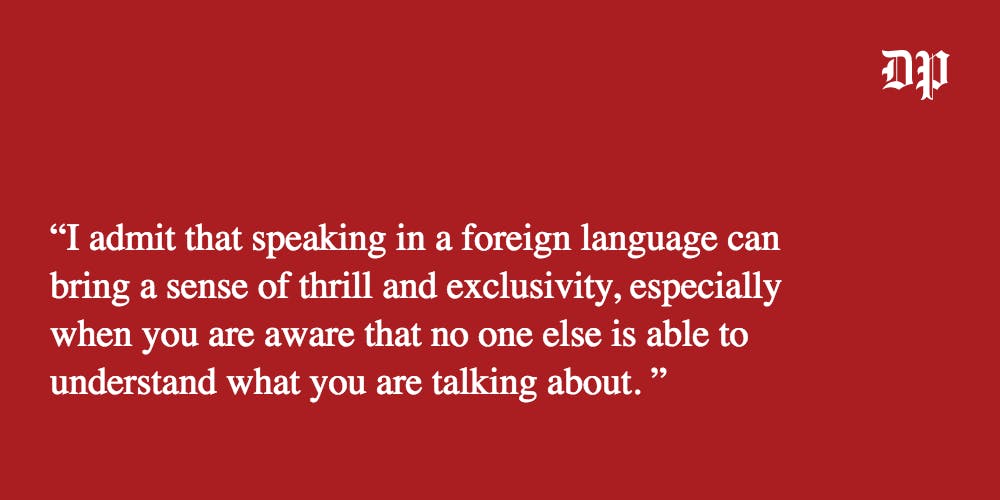
One will likely hear them on the first floor of Huntsman and the Starbucks Under Commons. Many travel in packs, donning long coats and texting away on an esoteric app called “KakaoTalk.” They are: Korean students at Penn.
Many Korean students are found chatting enthusiastically in Korean around campus, usually huddled in small groups. These Korean students are high-spirited and loud, and their voices can sometimes be heard across the room or down Locust Walk. So why is it that so many Korean students, who as Penn students have impeccable English skills, speak in Korean when together? This is a phenomenon that can be seen among both Korean-American and Korean-national students at Penn. Among Asian-American (not international) students, this case is uniquely Korean: In my experience, it seems to be less common for other Asian-American students to use Asian languages when together.
As a fluent South Korean who is currently sitting on the board of the Korean Student Association, I find myself scratching my head at this phenomenon. My personal take is that, while I would use Korean at school in circumstances such as calling friends and family or in a language course, I primarily speak in English with all of my acquaintances. However, I admit that speaking in a foreign language can bring a sense of thrill and exclusivity, especially when you are aware that no one else is able to understand what you are talking about.
Despite my own preferences, there are countless Koreans at Penn who still choose to text and speak to each other in Korean. I would like to propose a few possible reasons for this occurrence. Perhaps the use of Korean was influenced by the rise in prominence of Korean culture through technology and K-pop. Or perhaps it is a way to connect with like-heritage students in a school teeming with people from every corner of the globe. Maybe, it is just a way to look cool.

What’s for sure is that for a Korean American to be fluent in Korean earns recognition from both family and school seniors. South Korea has rigid Sunbae-Hoobae (senior-junior) norms, in every setting including the home, workplace, school, and college life. It is a given to be polite and eloquent when speaking to Koreans older than you, even if it is just by one year. It also isn’t uncommon for younger students to always greet older students first, and maybe even treat them to meals and coffee.
In this way, Korean underclassmen may be seeking to look good to their seniors in organizations such as the Korean Student Association, Wharton Korean Undergraduate Business Society, or PennSori (Penn’s premier Korean a cappella group), where networking and friendships thrive on Sunbae-Hoobae relationships.
This phenomenon may also be reflective of Korean society. In South Korea, it is common to establish in-groups and out-groups for anything from socializing to school life. Given the importance of in-groups and the highly compacted society of South Korea, it is very inconvenient to be non-conforming. In fact, many South Koreans criticize returning Korean Americans for not being able to speak Korean perfectly or adopting too many western values. I have seen also this self-selection among Korean international students at Penn, who tend to form circles of “real” Koreans studying abroad, from Korean Americans who have become too “Americanized.”
Despite these idiosyncratic reasonings, speaking in Korean at school might just be a reflection of the very human desire to relate to others and find common ground. There are certainly many exciting topics that a Korean would be hard-pressed to describe in any other language, especially in regards to hometowns, K-pop, and the oddly prevalent blood-type personality matching. I know I would certainly find it awkward to rave about my favorite Korean BBQ dish, beef chitterlings, without using its Korean name, “gopchang.”
But whether it’s Korean or Swahili, I believe that outside of class and student organizations, students should be free to speak whatever language they choose. Unfortunately, this doesn’t come quite as naturally to a few. At a Walnut Creek, Calif. Starbucks a woman ostracized two Korean students for speaking in “Oriental,” a moment that went viral.
While speaking a foreign language may be perceived as exclusionary to some, I believe the choice should ultimately be the prerogative of the speaker. This especially rings true for an exceptionally cosmopolitan school such as Penn.

JENNIFER LEE is a College sophomore from Fairfax, Va. studying international relations. Her email is jlee2017@sas.upenn.edu.
The Daily Pennsylvanian is an independent, student-run newspaper. Please consider making a donation to support the coverage that shapes the University. Your generosity ensures a future of strong journalism at Penn.
Donate







